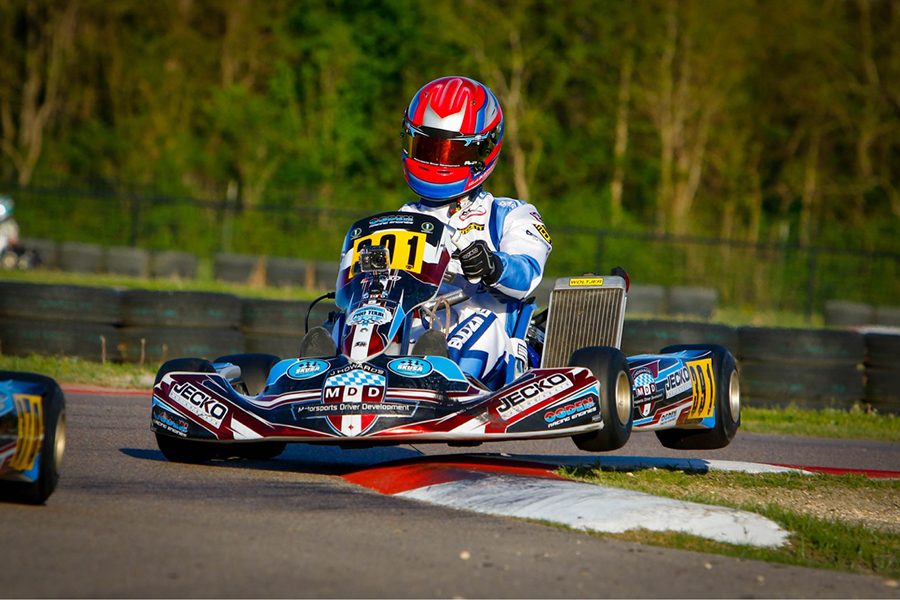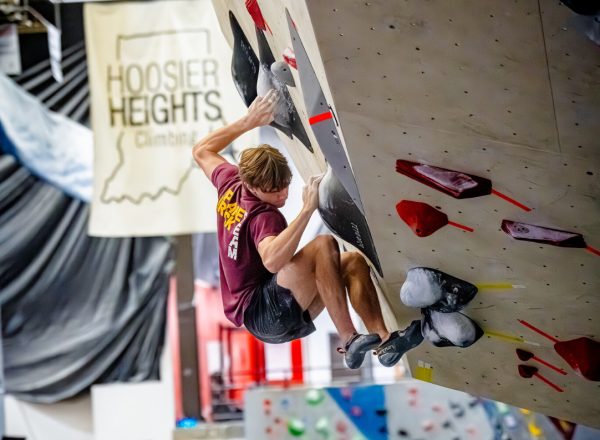“Pay”ving the way to victory
His mind doesn’t stray for more than a second, not to the nagging pain of exhaustion biting at his arms, nor the anything else except the track. Elliott Budzinski is completely focused. As he is whipping around the track and weaving through the other racers the adrenaline keeps every single fiber in his body tuned to his kart and the track below him. Every one of his motions is deliberate insuring that he hits all his breaking points and his turns.
“You’re completely focused,” Budzinski said. “There’s no break, there’s no taking time off. There’s no thinking about anything else. Because if you do, you’re just going to do worse. And you’re so focused because you’re going so fast your brain doesn’t let you unfocus that’s how focused you are. Not only that, but the adrenaline from going 80 miles an hour. You’re going 80 miles an hour and pulling two and a half to three g’s in the corner. That’s there’s just so much adrenaline within that, that comes with it, it’s really the thrill of racing and that pulls you right back to the present”
Racing has become a huge part of life for Budzinski, a Community High student. Starting from when he first got into the sport at five years old “It’s a sport, but it’s taken up my whole life,” Budzinski said. “Every single weekend, in the summer, everything that I do, basically revolves around racing now.”
However, just as racing was integrated into Budzinski’s life, wealth was integrated into racing. “Money is literally everything,” Budzinski said. “Basically, if you have money, you can buy your way to the top through good equipment.”
When Budzinski started racing as a five-year-old his first kart was tiny and was not that fast either. As he worked his way up though he gradually got faster. The feeling of adrenaline is what continually brought him back to the sport and kept him committed. Racing was mostly for fun and wasn’t that competitive until at 12 years old he started to get good at local races and decided to make the jump to national competitions.
“When I was about 14, or 15, and we started really doing good nationally,” Budzinski said. “and got on a good team, moved up a class and that was really where things started truly picking up.”
As the competition picked up so did the cost. Budzinski’s competitors started to accumulate corporate sponsors to help cover the cost of the sport. Wealthier parents doled money out of their own pockets to buy even better karts, engines and equipment for their child.
Even at an early age, it was apparent that racing was a very economically exclusive sport. Most of Budzinski’s friends never tried racing. “The group of people who race is small,” Budzinski said. “Mostly because it’s more expensive than other sports and because of this a lot of people never start”. The racing community was very exclusive and especially as the competitions parents began paying their children’s way to victory would only continue to become more so.
One of the reasons participants in kart racing at Budzinski’s level are willing to put so much money into the sport is because of the possibility of getting much more out. Successful kart drivers in national leagues like the one Budzinski is in are put on a fast track to professional racing once they switch over to cars where drivers consistently earn seven figure salaries.
“Racing is a very precise sport,” Budzinski said. “It’s often only a matter of seconds separating first place from last or a tenth of a second per lap.” It is because of how close races are that money plays a huge role in the sport because even slightly better equipment can take someone from last place to first. For that reason skill can be, and often is, replaced by machinery.
“One of the best feelings is when I beat a guy who spends five, ten times more than I do on equipment or gear,” Budzinski said. “Because it shows that I can beat him even with his advantage.”
Though hard work, athleticism and individual skill are what the sport of racing should be about, wealth is often the deciding factor — acting as a handicap for the economically fortunate.
“The skill of racing is what it’s all about and it’s what makes it worthwhile,” Budzinski said. “Sure money has its place in racing because it drives innovation of new better engines and kart and creates a need for advertising . but if I get beat by someone who I know I’m better than solely because they have a better engine I feel cheated and I think that in order to win you have to do it in such a way that your competition feels cheated then that’s not how the sport should be played.”









